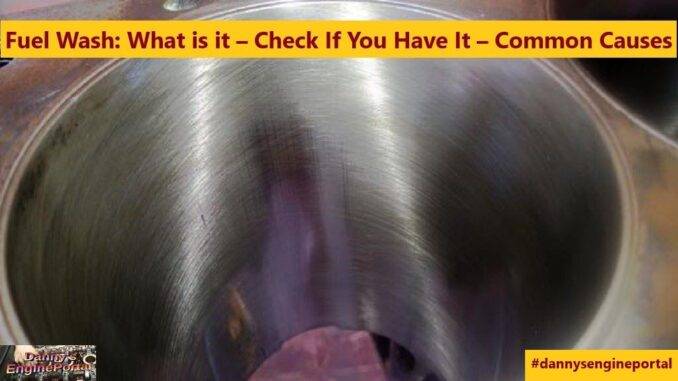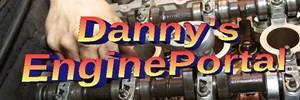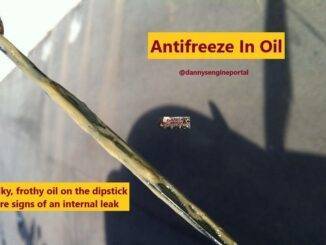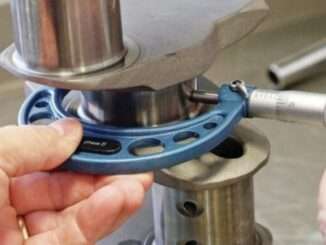
There is a condition, that adds to many engine failures, generally referred to as, “fuel wash”.
Above all, there is only thing protecting your cylinder walls and bearings, from fuel wash.
Consequently, that is, the thin layer of oil on them. So, when you douse the inside of the engine with raw fuel, you wash off that protective layer of oil.
First, any unburnt fuel in the cylinders, can cause, “fuel wash”. Then, your left with, a wet mixture of raw fuel. And, that literally “washes” the oil away.
So, in the early days, carburetors were the biggest problem. Because, rich fuel mixtures, washed the oil, off the cylinder walls, diluting the oil in the crankcase.
Meanwhile, fuel injection, has all but stopped the fuel wash problem. But, we are not out of the woods, because it still happens. A common symptom, of a potential issue with a fuel injector, is a fuel smell.
Two Simple Ways, To Check For Fuel Wash:
- Pull out your oil dipstick and smell the oil on it. If it smells like fuel, then raw fuel is getting past your rings and into the oil.
- Remove a spark plug or two and see what they look like. A plug fouling from fuel will have a fine, black sooty powder on it. And, it may smell like fuel and be wet.
What Can Cause, Fuel Wash:
Leaking fuel injectors
The number one cause would most likely be, leaking fuel injectors. This usually takes place, when the engine is off. Due to pressure on the fuel rail, fuel will push itself down into the cylinder.
And, slowly drip down, into the oil pan. But, in this case, you will observe that the engine, would be hard to start and idle rough. Especially, when parked overnight, until the dumped fuel in the cylinder clears off.
Fuel will leak out, with a stuck open fuel injector. Then, fuel will definitely get into the oil, causing “fuel wash”. Furthermore, if the fuel pressure is too high, that may also cause fuel, to get into the engine oil.
Vacuum Leaks
Vacuum leaks, in today’s computer controlled engines, can cause very serious engine damage.
When An Engine, That Has Computer Controlled Spark And Fuel Systems Has A Vacuum Leak, The Following Events Occur:
- Because, the vacuum leak pulls in outside air, the “air fuel” ratio is altered. Causing, a lean condition.
- The lean “air fuel” condition, is picked up by the exhaust oxygen sensors (O2). Then in turn, report this to the computer.
- The computer then tells the fuel system “hey, we need more fuel”.
- As a result, the fuel delivery is now, altered to inject more fuel.
- The result of this is, an excess of fuel. And, that can end, in a “fuel wash” condition.
- The fuel diluted the oil on the cylinder walls, until metal to metal contact occurs.
This Problem, Can Cause Very Serious Damage To The:
- Cylinder bores
- Pistons
- Piston rings
- Engine bearings
Common Causes Are:
- A fuel system malfunction
- Over fueling, when the engine fails to start
At this point metal to metal contact occurs, and scuffing takes place. This condition is similar to and is also sometimes referred to as, “dry start”.
Rebuilt or Reconditioned Engines
A correctly assembled engine, will start almost immediately. But, if after a reasonable period of cranking, the engine does not start, something is wrong!! As a result, you should check, ignition, and fuel systems.
Because, without spark, the fuel in the cylinders will reach a saturation point, and “fuel wash” will occur. Finally, it will severely dilute and thus weaken the oil film, and scuffing will start. Consequently, engine bearings, are usually the first to go.
Although diesel fuel, has increased lubricity over gasoline, fuel wash still must be avoided or serious damage will result. Also, engine manufacturers’ manuals should be, read and closely followed. This includes correct fuel timing, “fuel air” ratios, servicing of injectors, pumps, etc. Fuel filters and water removal systems, should be fully serviced at overhaul.
Conclusion
Finally, good engine maintenance and good common sense, can all but eliminate this potentially serious problem.
BY DANNY BENDER




